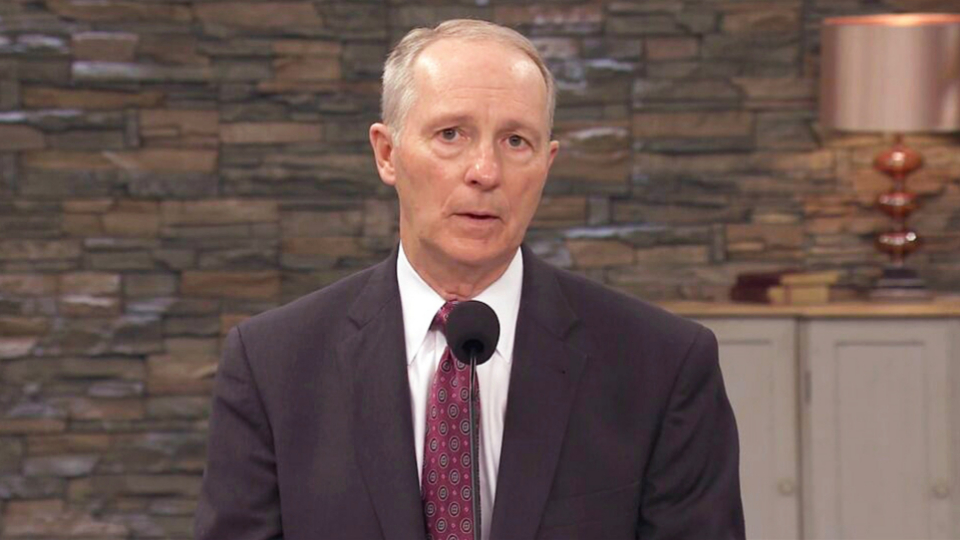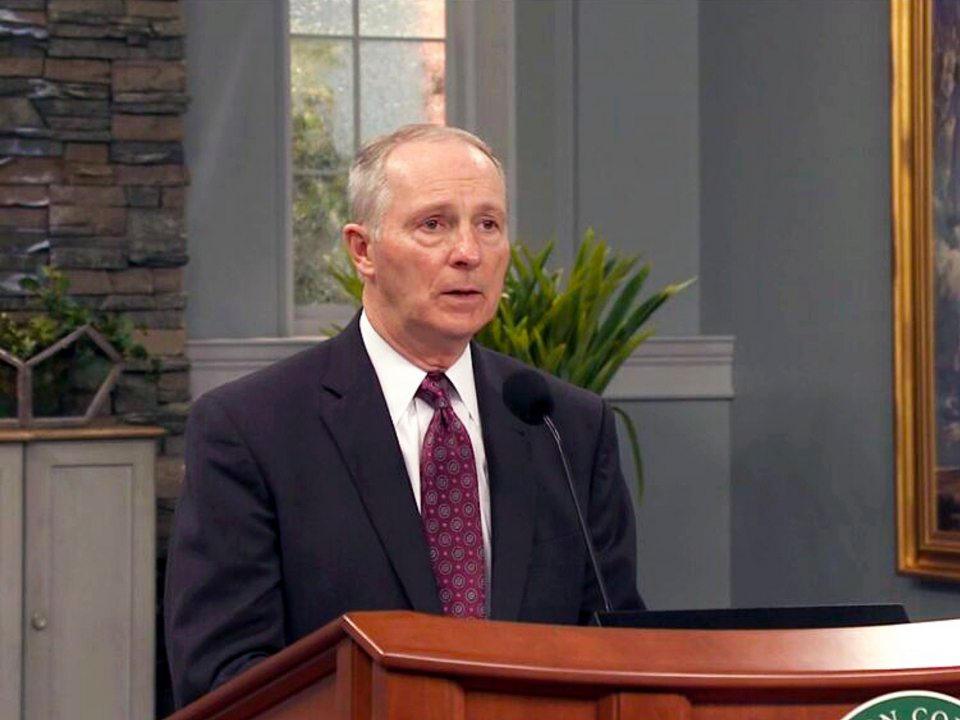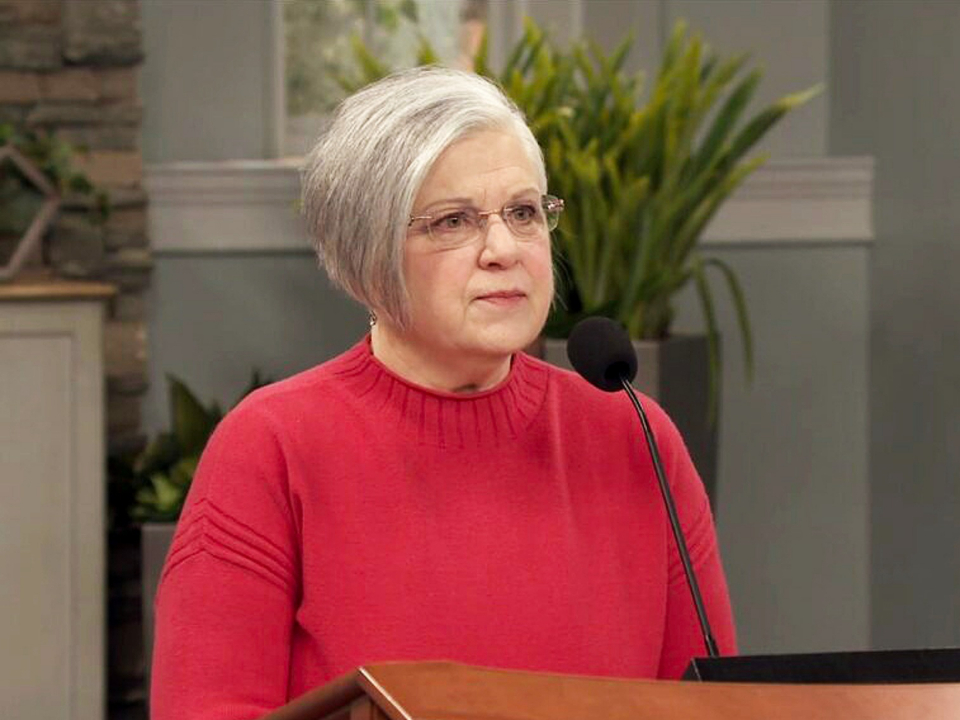
Kusch
Ensign College President Bruce C. Kusch speaks during a campus devotional broadcast on Tuesday, January 12, 2021. Image is a screenshot from the broadcast.2021 by Intellectual Reserve, Inc. All rights reserved.This story appears here courtesy of TheChurchNews.com. It is not for use by other media.
By Rachel Sterzer Gibson, Church News
Ensign College President Bruce C. Kusch issued a special invitation to students to remember, reflect, ponder and record the important things the Lord teaches them.
“Remembering God and His blessings is an important and essential part of our personal worship. Not remembering, even forgetting God, is a bigger problem than not knowing Him at all,” President Kusch said during the campus devotional broadcast on Tuesday, January 12, 2021.
Speaking in the first devotional of the new year, President Kusch began his remarks by reminiscing about both experiences to be remembered and others that, for a variety of reasons, can’t be forgotten.
For example, when he was serving as president of the Mexico Cuernavaca Mission, they would end every meeting by singing “Hark, All Ye Nations” (Hymns, No. 264).
“It was our hope that, whenever one of our missionaries heard or sung that for the rest of their lives, it would cause them to reflect on their missionary service, and they would once again feel the spirit of everything wonderful they experienced,” President Kusch recalled.
One memory that will never be forgotten, he said, was that “on our first date, I forgot Sister Kusch’s name.”
President Kusch noted that over 400 references in the scriptures include the word “remember.” The Book of Mormon encourages readers to remember God and His mercy as well as how He delivered the righteous from bondage and danger. The resurrected Savior teaches the Nephites about the sacrament and how partaking worthily would stand as a testimony that they always remembered the Son.
“Clearly, remembering God and Jesus Christ should be an intentional part of our personal worship,” President Kusch said.
President Kusch then shared the example of Alma the Younger, who “never forgot what he experienced following the visit of the angel calling him and the sons of Mosiah to repentance. In the midst of his torment, he remembered his father’s prophecies regarding the coming of Christ.”President Kusch also shared the admonition of King Benjamin to “always retain in remembrance, the greatness of God” (Mosiah 4:11).
To the revelation given to “remember, the worth of souls is great in the sight of God” (Doctrine and Covenants 18:10), President Kusch added, “remember the worth of your soul is great in the sight of God.”
Personal and intentional remembering benefits individuals as they reflect, ponder and record personal revelation they have received, President Kusch said. “Our effort to reflect and ponder allows the Holy Ghost to teach us important lessons and prepares us to learn and be taught new things.”
There is power in remembering and purpose in reflecting and pondering, President Kusch declared. “Remembering, reflecting and pondering encourage us to act, to repent and to change. Recording what we learn is a demonstration of gratitude, a witness of testimony, a commitment to act, and can be an essential resource to help us and others in the future.”
After six chapters’ worth of instruction, the Savior invites the Nephites to return home and ponder and pray about what He has taught, President Kusch noted. The next two chapters record the miracles of healing and the Savior’s personal ministry to the little children. “Pondering can follow instruction or significant experiences but also is preparatory for receiving more,” he explained.
In partaking of the sacrament, individuals are reminded of their covenants. “We reflect upon the Savior’s atoning sacrifice. We ponder our own standing before the Lord. We renew our desire to repent, to change and to improve,” President Kusch said.

-Kusch
Ensign College President Bruce C. Kusch speaks during a campus devotional broadcast on Tuesday, January 12, 2021. Image is a screenshot from the broadcast.2021 by Intellectual Reserve, Inc. All rights reserved.Five Remembered Lessons
President Kusch then shared five lessons he has remembered, reflected on and pondered, using personal experiences to illustrate each one:
- “You are going to have disappointments in life. Appreciate them. It just may be the Lord’s way of preparing you for even greater blessings.”
- Helping someone achieve or accomplish something is heroic.
- “Wherever you are now is the best place you’ve ever been.”
- “Seek the forgiveness of someone you may have wronged before it’s too late.”
- “The Lord’s timing matters — a lot!”
In conclusion, President Kusch told students, “Brothers and sisters, I invite you to remember. I invite you to reflect. I invite you to ponder. I invite you to record the important things the Lord teaches you. And I invite you to act promptly on the impressions you will receive from the Holy Ghost. Doing so will lead you closer to God as you ‘hear Him.’”

Kusch
Sister Alynda Kusch speaks during a campus devotional broadcast on Tuesday, January 12, 2021. Image is a screenshot from the broadcast.2021 by Intellectual Reserve, Inc. All rights reserved.Desire, Decide and Do
In her remarks, Sister Alynda Kusch offered three things to help individuals navigate safely on the covenant path, which she called “the three D’s: desire, decide and do.”
Of the first D — desire — Sister Kusch said, “Our desires lead us to action. If our goal is to stay firmly on the right path, traveling toward our destination, we can pray for the spiritual gift of desiring to do the things that will help us realize our worthy goals. We can ask the Lord to help us want to do those things that are required.”
For the second D — decide — Sister Kusch explained that she was talking about the decisions that will guide worthy actions.
“When you make a decision that is prompted by the desire to do something worthwhile, then it is so much easier to have the resolve to see that desire turned into action,” she said.
Sister Kusch told students, “Deciding on a goal and determining a plan on how to achieve it will serve you very well this semester. Look at what you want to do, decide that you will do it, and then make a plan on how you can accomplish that goal.”
Wanting, deciding and even planning are not enough, Sister Kusch said in introducing the third D — do.
“As you prayerfully determine where you want to be and what you want to be in April at the end of the semester, the Lord will open your eyes and your mind and your heart and you will know how to realize your desires,” she said. “Then decide that you will do something about it, make a plan, then get up on your feet and do your best.”
Copyright 2020 Deseret News Publishing Company